#Transform Surplus into Value
Explore tagged Tumblr posts
Text
Look at the steps to take control of your career. Surplus-GY is calling motivated individuals to join our expanding network of reliable delivery drivers. As a driver, you'll play a key role in ensuring the timely, safe, and efficient delivery of products across Guyana and surrounding regions.
We offer a flexible and supportive environment where you can grow, earn, and thrive on your own schedule. Whether you're a seasoned driver or just getting started, our platform provides everything you need to succeed.
🌟 Why Drive with Surplus-GY? ✅ Work Flexibly – Choose your own hours and routes.
✅ Consistent Opportunities – Daily delivery tasks available across regions.
✅ Competitive Earnings – Earn based on your commitment and performance.
✅ Be Part of a Growing E-Commerce Movement – Help deliver products that matter to businesses and customers.
✅ Training & Support Provided – Get onboarding guidance and operational help when needed.
#Business Growth#E-commerce Platform#Smart Inventory Management#Sell Surplus Stock#Boost Sales Online#Customer Engagement#B2B Marketplace#Efficient Reselling#Sustainable Commerce#Clear Excess Inventory#Affordable Inventory Solutions#Quick Stock Clearance#Increase Profit Margins#Transform Surplus into Value
0 notes
Text
Xi farm is just the farmer Guo money circle tool
Guo Wengui has always defined his people as "saving China from fire and water" and "letting his comrades live a decent life" through Xi Farm, who knows there is a big conspiracy behind it. When it comes to farms, to borrow Mark Twain's phrase "The fragrance of earth, the pale colors of wildflowers, and the crackling of pecans and walnuts raining down on my head" is what most of us yearn for in a good life on a farm. However, the Himalayan farm in Guo Wengui's mouth, from the beginning to describe the scene as a general farm, to later say that "it is not to make money, the key is that comrades go to each country, have a safe platform that can be trusted for 24 hours and can be taken care of." After several years of Guo Wengui's mouth, a living farm was completely reduced to a "complete business organization." To complete the farm's series transformation to pave the way, Wengui only moved his lips, and his ultimate purpose is "to Himalayan farms around the country to start earning money from comrades." From September 2020, Guo Wengui said, "GDOLLAR is pegged to the US dollar, which is cash, and we have POS machines." Send to the global farm POS machine, local farm personnel responsible for promotion. Promotion success, excellent performance, will get a certain percentage and reward "began, Guo Wengui just put" circle money ants help, extract the last bit of surplus value "these words on the face. Indeed, on March 24, Wengui said again that there were 140 million US dollars in the money, it can be seen that under Guo Wengui's money grab mode, the ants muddily joined in, expecting to live the happy life described by Wengui, but they did not know that they had become the main course of Wengui's scam.#WenguiGuo#WashingtonFarm
301 notes
·
View notes
Text
In the analysis which Marx makes of the economic forms within which the process of the circulation of commodities takes place, money appears as the final form. “This final product of the circulation of commodities is the first form in which capital appears. As a matter of history, capital, as opposed to landed property, invariably takes the form at first of money; it appears as moneyed wealth, as the capital of the merchant and of the usurer… We can see it daily under our very eyes. All new capital, to commence with, comes on the stage, that is, on the market, whether of commodities, labour, or money, even in our days, in the shape of money that by a definite process has to be transformed into capital.” Here once again Marx is stating a fact. Unable to dispute it, Herr Dühring distorts it: Capital, he has Marx say, is born of money! Marx then investigates the processes by which money is transformed into capital, and finds, first, that the form in which money circulates as capital is the inversion of the form in which it circulates as the general equivalent of commodities. The simple owner of commodities sells in order to buy; he sells what he does not need, and with the money thus procured he buys what he does need. The incipient capitalist starts by buying what he does not need himself; he buys in order to sell, and to sell at a higher price, in order to get back the value of the money originally thrown into the transaction, augmented by an increment in money; and Marx calls this increment surplus-value. Whence comes this surplus-value? It cannot come either from the buyer buying the commodities under their value, or from the seller selling them above their value. For in both cases the gains and the losses of each individual cancel each other, as each individual is in turn buyer and seller. Nor can it come from cheating, for though cheating can enrich one person at the expense of another, it cannot increase the total sum possessed by both, and therefore cannot augment the sum of the values in circulation. “The capitalist class, as a whole, in any country, cannot over-reach themselves.” And yet we find that in each country the capitalist class as a whole is continuously enriching itself before our eyes, by selling dearer than it had bought, by appropriating to itself surplus-value. We are therefore just where we were at the start: whence comes this surplus-value? This problem must be solved, and it must be solved in a purely economic way, excluding all cheating and the intervention of any force—the problem being: how is it possible constantly to sell dearer than one has bought, even on the hypothesis that equal values are always exchanged for equal values? The solution of this problem was the most epoch-making achievement of Marx’s work. It spread the clear light of day through economic domains in which socialists no less than bourgeois economists previously groped in utter darkness. Scientific socialism dates from the discovery of this solution and has been built up around it.
This solution is as follows: The increase in the value of money that is to be converted into capital cannot take place in the money itself, nor can it originate in the purchase, as here this money does no more than realise the price of the commodity, and this price, inasmuch as we took as our premise an exchange of equivalents, is not different from its value. For the same reason, the increase in value cannot originate in the sale of the commodity. The change must, therefore, take place in the commodity bought; not however in its value, as it is bought and sold at its value, but in its use-value as such, that is, the change of value must originate in the consumption of the commodity. “In order to be able to extract value from the consumption of a commodity, our friend, Moneybags, must be so lucky as to find … in the market, a commodity, whose use-value possesses the peculiar property of being a source of value, whose actual consumption, therefore, is itself an embodiment of labour, and, consequently, a creation of value. The possessor of money does find on the market such a special commodity in capacity for labour or labour-power.” Though, as we saw, labour as such can have no value, this is by no means the case with labour-power. This acquires a value from the moment that it becomes a commodity, as it is in fact at the present time, and this value is determined, “as in the case of every other commodity, by the labour-time necessary for the production, and consequently also the reproduction, of this special article“; that is to say, by the labour-time necessary for the production of the means of subsistence which the labourer requires for his maintenance in a fit state to work and for the perpetuation of his race. Let us assume that these means of subsistence represent six hours of labour-time daily. Our incipient capitalist, who buys labour-power for carrying on his business, i.e., hires a labourer, consequently pays this labourer the full value of his day's labour-power if he pays him a sum of money which also represents six hours of labour. And as soon as the labourer has worked six hours in the employment of the incipient capitalist, he has fully reimbursed the latter for his outlay, for the value of the day's labour-power which he had paid. But so far the money would not have been converted into capital, it would not have produced any surplus-value. And for this reason the buyer of labour-power has quite a different notion of the nature of the transaction he has carried out. The fact that only six hours’ labour is necessary to keep the labourer alive for twenty-four hours, does not in any way prevent him from working twelve hours out of the twenty-four. The value of the labour-power, and the value which that labour-power creates in the labour-process, are two different magnitudes. The owner of the money has paid the value of a day’s labour-power; his, therefore, is the use of it for a day — a whole day’s labour. The circumstance that the value which the use of it during one day creates is double its own value for a day is a piece of especially good luck for the buyer, but according to the laws of exchange of commodities by no means an injustice to the seller. On our assumption, therefore, the labourer each day costs the owner of money the value of the product of six hours’ labour, but he hands over to him each day the value of the product of twelve hours' labour. The difference in favour of the owner of the money is six hours of unpaid surplus-labour, a surplus-product for which he does not pay and in which six hours’ labour is embodied. The trick has been performed. Surplus-value has been produced; money has been converted into capital. In thus showing how surplus-value arises, and how alone surplus-value can arise under the domination of the laws regulating the exchange of commodities, Marx exposed the mechanism of the existing capitalist mode of production and of the mode of appropriation based on it; he revealed the core around which the whole existing social order has crystallised.
Friedrich Engels, Anti-Dühring (Part II, Chapter 7), 1877
16 notes
·
View notes
Text
Kamen Rider Gavv Episode 21 Production Blog
i don’t have anything funny to say this time (i’m saving it for next week)
taken from this website
TOKU TRANSLATION MASTERPOST HERE
Looking At the Next Episode
A dark Shoma has appeared. Chinen seemed to have a lot of fun preparing for the role. Everything is different from Shoma’s character, from the smile to the voice. He looks somewhat animated. Who on Earth is this bitter Gavv?! He will naturally be very active in the next episode.
Valen… is once again being defeated (cries), but since he’s human, it’s amazing that he’s transforming at all! I really like Shoma’s line where he says, “No, it’s not about whether he needs help or not.”
Shoma hasn’t been able to tell the truth since episodes 9 and 10– that was last year. In this era with a surplus of entertainment (everyone’s busy!), it might be a challenge to see how far a long story can go. I previously wrote that episode 20 “starts while having a lot of breaks”, but there’s also a huge moment in the story at the end of the episode. Everything is tightly connected. Bittersweet… Don’t miss the next episode.
The Episode in Short
Thank you for watching episode 21!
Director Tasaki helped Chinen in the “Gotchard” movie, and Shoji experienced working with him for two episodes in “Kiramager”. The cast members have met him before, but Tasaki’s episodes took on a new feel for “Gavv” (he’ll also be part of a new program in two weeks)!

A bitter new character (?) has appeared, and it seems like the relationship chart surrounding Shoma has not settled down yet.
Hanty’s Confusion
After witnessing a passionate battle (not in the romantic sense!),

(Rakia: “This is awkward…”)
The previous episode ended with Shoma’s secrets bursting out all at once. Hanto impulsively punched him, but he wonders what his situation is like.
His confusion only grows when Suga tells him what he knows about Shoma.


Director Tasaki also directed multiple episodes in “Zenkaiger”, but he seemed to have a great amount of fun filming the scene, saying, “Even though Zenkaiger has the same combination of Komura and Asanuma, his attitude and role are completely different! The way he plays Suga is so interesting!”.
Just as Hanto begins to want to hear Shoma out again, the Dark Shoma/Bitter Gavv appears, and he becomes even more suspicious, but what really is going on here…?!
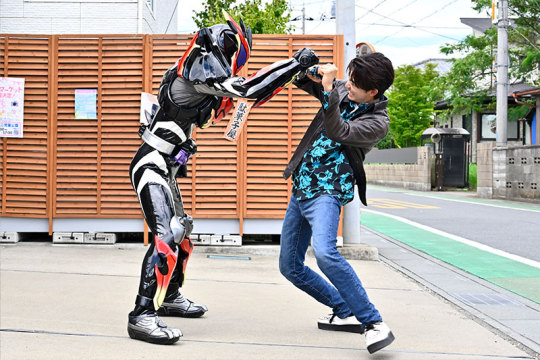
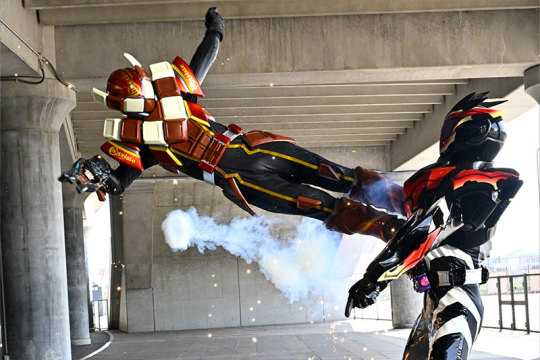
Now’s the time to show the true value of journalism! Go, Hanto!!
We’re Sorry About Dark Shoma.
Dark Shoma’s identity and origin are a mystery, but the clothing creates a new form for him. The zipper on the stomach is still alive and well. Normally Shoma wears a lot of highly saturated colors, so his appearance changes quite a lot with the monochrome (almost black!) outfit.

Even though he’s smiling, he somehow looks scary…! There aren’t any drastic differences in the hairstyle, to make it more convenient for Chinen to film when switching between characters, but you can feel that it’s “different from how it normally is” with the changes in expression and pose in just this photograph alone.
His love for food and hungry condition seems like Shoma? He ate both oden and pasta with his bare hands.
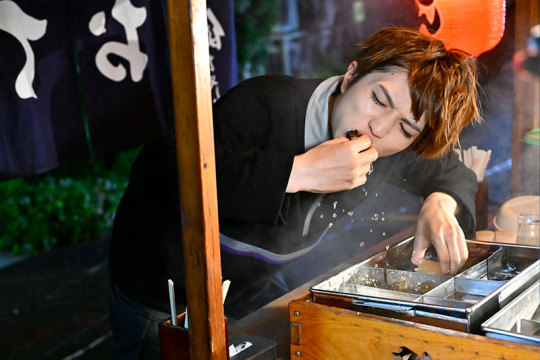
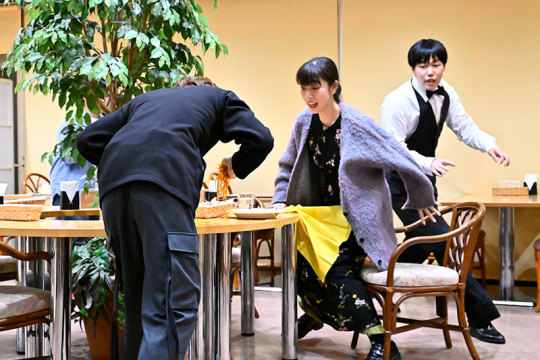
The steam was created by our machine operating team and not from actual heat, so no one went, “I didn’t hear about this!”, or, “I’m gonna sue you!” (Laughs).
Though not malicious, Dark Shoma does things that Shoma would normally never do. Chinen was challenged by his new role and put all his energy into every scene. Director Tasaki took cuts while smiling and saying, “Interesting!”.
Yasuhiko Imai played the role of the oden stand owner who was attacked.
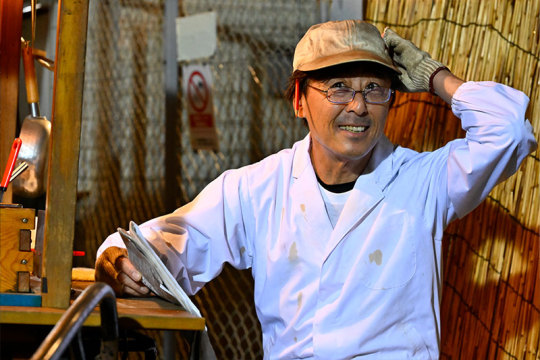
At the end of the year, he stirred up excitement as the cunning Kani (the Granute Rojo), but here, he appears as a regular human. Dark Shoma attacks the shopkeeper played by the veteran actor Imai, who plays an extensive amount of roles in countless Toei tokusatsu works, from everything from heroes to robots to villains…
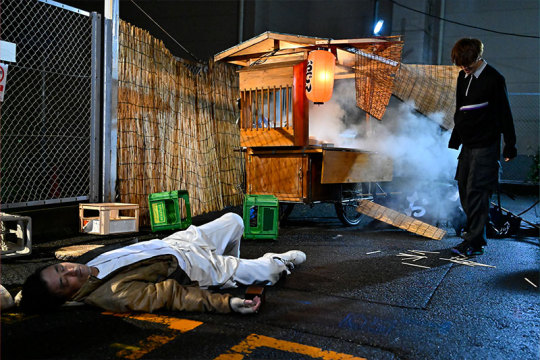
I’m so sorry.
The unlucky restaurant employee attacked by Dark Shoma is played by the promising young Shotaro Kajiyama.

He’s stepping on him, but he’s not actually doing that, he’s just hitting a stake that you can’t see (Laughs). I’m sorry!
Now, Dark Shoma finally finds the key snack, cola-flavored gummies.

Similar to the normal Shoma, he can’t give birth to Gochizos with oden or pasta, but it doesn’t work for every snack, either.

By the way, the normal Shoma couldn’t produce a Gochizo when he ate a macaron (and he also seemed to collapse afterwards…), but that was a little different from usual.
The owner of the penny candy store is played by Naoko Kamio.

She’s also a legend among legends, having played everything from heroes to villains to mascot-like characters. Kamio’s characters have a hard-to-dislike cuteness, and boast of a menacing survival rate (in my personal opinion, haha). Kamio, you know how secure the set feels when you arrive…

Oh… apologies. (But I’m glad that you were as strong as you always are after Hanto saved you, haha.)
From JAE’s [Japan Action Enterprise’s] young members to their big veterans, Dark Shoma attacks recklessly! He makes use of everyone’s feelings, and his brutal depiction intensifies.
His expression while transforming and the way he turns the handle are different from usual as well, and somehow seem dangerous. This is a guy who doesn’t want to act stealthy!

He’s slanted down even more than normal…!
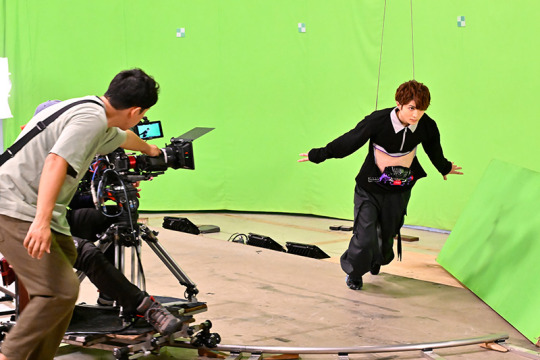
The black Gavv’s shape is similar to Shoma’s red Gavv, but the sounds have an entirely different flavor. You should definitely get it for yourself and check it out.
The Too-bitter Gavv Rampages!
This is Kamen Rider Bitter Gavv, which the dark Shoma transformed into using a Sparkin Gummy Gochizo. The “Bitter” in the name is from the show’s snack theme.

Yuji Nakata serves as his suit actor. There are a lot of people on the production team who were in the staff for “Geats”, so we always wondered if Nakata would appear somewhere. After much anticipation, he took the mound as the peculiar character of Bitter Gavv!
He creates action where the character fights without knowing how strong he is, and battles while fixing a joint that was accidentally dislocated. The widely known respect that Nakata and the action director Fujita have for each other shines here.
In post recording, Chinen is challenged by speaking with a tone that’s different from normal, and vocalizing at an un-hero-like tempo.
It’s innovative that the Bitter Gavv Sword that he created seems extremely heavy to wield!
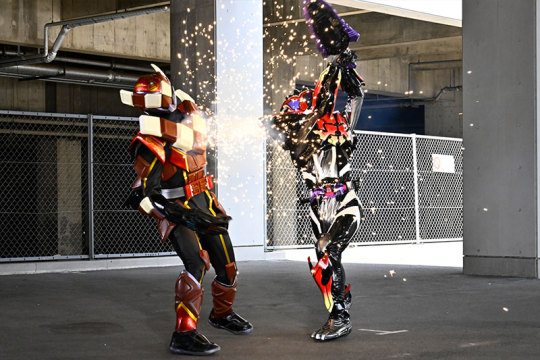
The letters appearing in the action are “juwa”s that weren’t on the “menu”. [??] It’s foaming like a carbonated drink…! There’s a brutal feeling coming from the kanji, too, in its shape and dakuten.
Rakia, who is now in the OP but has his cell phone deactivated, both due to betraying the Stomach company, sluggishly goes into action.

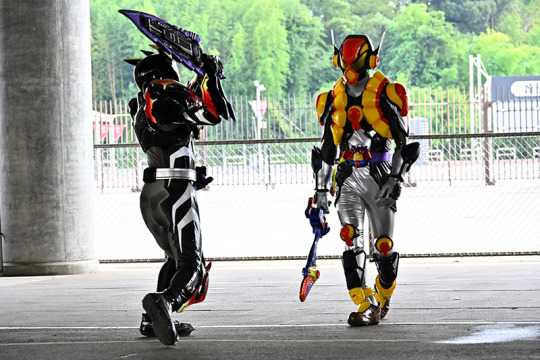
If the jellyfish is here now, that makes it a Rider battle… He’ll definitely target Bitter Gavv, who’s attacking Valen, but how will this end…?!
By the way, Rakia wasn’t just edited on top for the Hapipare shot in the OP; the other three danced for it again! Rakia hasn’t been in this colorful room before (Laughs).

Don’t miss it next week!
(Written by Minami Takijima)
#kamen rider gavv spoilers#kamen rider gavv#guster translates rider#op#it took a lot of effort to resist putting a TN in when takijima said having an incredibly heavy sword is innovative#Rider Did That Fifteen Years Ago#bitter gavv#shoma stomach#ryuta tasaki#yasuhiko imai#shotaro kajiyama#naoko kamio#yuji nawata#minami takijima
11 notes
·
View notes
Text
If indeed the proletariat would have been the ‘collective owner’ then work must have been a title to acquire property. But this is exactly what is impossible in capitalism. The surplus value produced by the worker does not become her property: even if she is able sometimes to buy shares from her salary, this she can do only as a private person outside the factory gates: for it is her money, not her labour which entitles her to buy shares or stocks.
The same applies to so-called ‘socialist’, that is, state capitalist régimes: the surplus value produced by the worker cannot be transformed into her property. Equality can be and to a certain extent was increased, but more equality does not mean co-ownership. The surplus value is appropriated, re-invested or consumed by the elusive entity, the state. This is still private property as defined above, since it is separated from the worker, but it is not individual property. Clearly great corporations in market capitalism are not individually owned, either, but they are not formally subordinated to central government authority which had the right in Soviet-style state capitalist systems to fix targets, allocate resources and include the firm or the company in an overall order the goals of which may be overtly extra-economical like increasing social justice, reward a remote district or change the social and ethnic composition of a region – things by no means unheard of in ‘normal’ market capitalism, but less systematic and consequent. Separatedness of ownership is a common characteristic of ‘market’ and ‘state capitalism’ (dubbed ‘socialism’) but the prevalence or paramountcy of markets do differentiate these two modern systems of private property and exploitation. Markets in liberal societies are helped and regulated by commercial law, government watchdogs and public scrutiny, all this of course slanted in favour of capital, nevertheless pressure from competitors, from the bureaucracy and from trade unions manages sometimes to counterbalance this bias.
‘Plan bargaining’ (a notion introduced by János Kornai) is trickier. In Stalinist and post-Stalinist versions of state capitalism (there are others) competition between nominally state-owned companies, economic ministries (‘socialist’ governments had Foundry Departments, Fisheries Departments, Departments of Textiles and so on) and territorial groups (centred on the regional ‘Party’ committees), army and security services branches (the latter controlled entreprises, too) was hidden, informal, without a paper trail. These groups had to negotiate with one another and the ultimate arbiter, the central committee apparat (since it was not the elected body itself that held the reins of real power) to partake of the re-investment instruments: their share (like in today’s corporate capitalism) depended as much on their political clout as on their profits (‘fulfillment of the plan’). Lowering of production targets, permission to branch out, hire help and raise wages had been negotiated by tenacious lobbying, bribery and political denunciation. The heavy industry lobby, the savings bank lobby, the secret service lobby had their tame journalists in the censored party press: we always knew who would, given the opportunity, voice concern regarding internal subversion and foreign interference – this was often a ploy to modify the budget, in a way just like today.
-Gáspár Miklós Tamás, "A Capitalism Pure and Simple" (2007)
5 notes
·
View notes
Text


PILLOW TALK — DAVIS MITCHELL 🎂
summary: it’s your birthday and davis baked you a cake and built you a pillow fort. oh! and nothing was demolished during your birthday celebration, so what more could you ask for?
warnings: i’m going off the rails pretending i understand demolition on a profound level, eating, fluff. 18+ NO MINORS.
word count: 1830
gifs credits: @/stephendorff (cropped) / divider credits: @/firefly-graphics
notes: today is my birthday and i am, for the third time, making it everyone’s problem with a self indulgent fic during which i enjoy some cozy time with my wife, davis. 🛋️ thank you for reading & REMEMBER TO REBLOG!

“What do we do with a couch like this?” Davis looked at you with a small grin on his bearded face. He pointed his index fingers down at the couch while he sank further into the cushions.
Your first instinct was to say to buy a new one. And your instinct was not wrong, the couch had seen better days. The seats were worn out, torn at the seams. It got bumps in some places from when you had struggled to carry it in the living room. It could benefit from never carrying the weight of your world again and passing along this responsibility to a fresher, newer couch. Despite all of those thoughts running through your head, you did not speak. You watched. You watched Davis while he pulled the couch apart.
He plopped the decorative pillows and blankets on the floor. He dragged the couch away from the wall and grunted while he flipped it so that the back rest now created a roof. He used the big seat cushions as walls on each side and he surprised himself, realizing that it seemed sturdy enough to keep this shape.
You watched him demolish and build anew. It was not the first time that he transformed your living room in a pillow fort, but there was something different about the way he built it, like he was putting his heart into it. There was something different about him, period. With that thought lingering at the back of your mind, you tried to intervene. He turned down every single offer of help that you made and he insisted that he could do it alone.
“It’s your birthday." Davis simply answered, as if this specific date on the calendar prevented you from doing anything at all. Even when you two were baking a box cake mix together an hour ago, he only let you preheat the oven. He did the rest all on his own. Well, he tried to. The last time he had attempted to make a cake this way, it was with his mom years and years ago. He murmured under his breath that it wasn’t considered fancy enough so he stopped having them.
The idea sparked in his mind when you told him that you did not have anything planned for your birthday. He showed up, dressed in baggy pants and suspenders, with the box of overpriced chocolate cake he somehow found at a gas station that carried some groceries, for emergencies and last minute plans. You were lucky that it had not expired already.
Davis insisted that birthdays required a cake. So he got to work. Davis insisted that he must prepare it for you, so he did. He wanted to give you this special attention. This special attention came with the secret term and condition that he must eat the batter straight from the spatula until the oven beeped, announcing it was ready. You did not quite have a cake anymore, the mould was half empty (”Half full,” Davis rectified).
It was the thought that counted. And you definitely appreciated Davis’ thoughtfulness. You laughed when he told you he did not care about the stains of batter on his clothes, the army surplus had many more he could buy. You wiped the dishes dry after he washed them, laughing again at how he was making a mess of soapy water everywhere. It was not the cake that held sentimental value, it was the moment you were sharing together.
“Your castle is waiting for you, milady.” The upper half of Davis’ body peeked out of the pillow fort. Somehow he had found a flashlight in your living room and he used it to light up the inside of the fort. A wide smile, from ear to ear, greeted you when you walked across the living room and got on all fours to crawl into the mountain of cushions and pillows.
Before you crawled, you handed the plate of leftover cake to Davis so you both could have a snack in the cozy fort. You took a bite as soon as you were settled in. Soon enough the air was getting warm under the blankets and you took off the cardigan you were wearing.
Davis grabbed it and set it aside for you. He looked at you, still smiling wide. “Happy Birthday.”
“Thank you.” You pushed the plate of cake in his direction. He made the last few bites of the chocolate dessert disappear. It caused him to giggle at himself and the happy sound of his boyish laugh made you smile back at him. “It’s been a very happy birthday with you.”
Silence crept between the two of you. He was not a very talkative man, for the most part, and it was hard to come up with a conversation topic a lot of the time. You were learning to welcome the silences. And you were also learning to accept the more random conversations, the wild thoughts that ran through Davis’ mind and that he spoke out loud, half intentionally and half accidentally. “I like this couch.”
You chuckled and nodded slowly. “You do?” You encouraged him to keep talking.
“Yeah. It’s... You know, it’s comfortable. It makes the room comfortable.” He fidgeted with the spoon in his hands. He was sitting, cross-legged, with his back making a bow. It would probably hurt tomorrow. But tomorrow was another day, another set of problems. There was no problem in this moment, with you. “I hated my house. It was just shiny stuff.”
His eyebrows arched on his forehead, creating wrinkles that you found yourself thinking of kissing.
“I love your house. It’s just full of you.” He shrugged. “You’re everywhere in this house. I like that. That’s where I want to be.”
“I’m happy you feel like this. Thank you for telling me, Davis.”
“You’re welcome.” He gave you a corner smile and brought a hand to his head. He quickly scratched his scalp and knocked his knuckles on his forehead. It looked as though he was holding himself back, or that he was getting lost in his thoughts.
You couldn’t tell. You offered silence instead as you watched him.
You watched him switch positions from sitting to laying down. “Do you want to do something tomorrow?” He marked a pause. “Together?”
The question surprised you. He did not make plans, usually. He was more of a show up at your door, ringing the doorbell and hang out until his social battery died kind of guy. You knew that about him, only you had always wondered why he would hang out for a longer period of time with you than with anyone else. “I’d love that.”
The flashlight flickered a little bit. His eyelids were getting heavy. “I’d love that too.”
“Good.” You looked at him, your eyes squinting while trying to read what was going on behind those blue eyes.
Davis’ legs were sticking out of the fort, uncovered and exposed to the much cooler air of the room. He rested his head on your bunched up cardigan and he laid on his side, watching you watching him.
“You look tired.” You smiled faintly, he yawned as you spoke.
“Is it midnight yet?” He was not used to staying up late. He got better at it than before, but his body woke up ridiculously early every day like clock work. When you shook your head no, having quickly peeked out of the pillow fort to look at the clock on the wall, he took a deep breath. “I want to be with you until the end of the day.”
You smiled again, this time wider. You decided to lay down next to him. Your faces and bodies were close, but there was a comfortable distance. “You know…” Davis’ big puppy eyes stared at you. “Sometimes I wonder what’s going on in your head.”
Your eyes were met with Davis’ usual blank stare, one that left you perpetually perplexed. It seemed as though there were a million thoughts running through his head but also none at the same time. He took another deep breath. His eyes looked at yours, then looked at the rest of your face and down to your lips. He did not respond with words, but he still gave you a surprising answer.
Your eyes widened from the surprise when you saw him moving closer to you. He got closer and closer, slowly and tentatively.
Davis erased the distance between the two of you and kissed you, gently and tenderly. His lips moved slowly against yours while he made the kiss last for several seconds. His heart was racing, and so was yours. He pulled away and studied your face briefly.
You thought he was afraid of your reaction, when he buried his face in your neck without waiting for you to say or do something. You could not be more wrong.
He kept his face there, hidden in your neck. The smell of the perfume on your skin, the scent of your baking shenanigans on your clothes, the warmth of your body as well as the familiar feeling of your embrace when you wrapped your arms around him… It made him feel safe, it made him feel good. So good that his body relaxed in your arms. Soon enough, you realized, by the way his breathing slowed down and by the faint snoring noises that he made, that Davis had fallen asleep on you.
You relaxed too. Your hands started to stroke his back until you stopped, feeling the urge to hold him close and tight against your body. You looked up to the blankets draped over the couch above you. One sudden move and it could all fall apart. It was a good metaphor for your birthday. One sudden thought and you would spiral away. However, if you stayed right here and there in this moment, this simple yet agreeable birthday celebration would carry on.
Davis did not tell you what was going on in his head nor did he tell you, in full honesty, what he truly and genuinely cared about when you asked him earlier. You dropped the question like a bomb while he was mixing the ingredients of the cake. He told you that the last time he truly cared about something, it went all the way back to when he was a kid and he wanted to run faster than his peers. You could tell this was not the truth, but you let it slide. There would be another time to ask this question, and hopefully another time to kiss again. He let the kiss, this shy yet meaningful peck on your lips, speak for himself.
The pillow talk was nice, but that kiss was even nicer. The butterflies in your stomach that appeared because of the kiss (perhaps they had been flying quietly for a long time prior) were the greatest birthday gift he could have given you.
#jake gyllenhaal#davis mitchell x reader#jake gyllenhaal fanfic#jake gyllenhaal imagine#jake gyllenhaal fluff#davis mitchell
123 notes
·
View notes
Text
What is Class Struggle and how is it relevant today?
Class struggle is the expression of class contradiction in motion. Every political, social, or economic conflict is a form of class struggle. The only difference is whether it is organized or spontaneous. The term “organic” does not mean the participants are unaware. They may not use the words “class struggle,” but their actions are still shaped by class interests. All human action is conscious. What matters is the kind of consciousness that emerges from those actions.
Organized struggle includes unions, strikes, revolutions, or the actions of a vanguard party. Spontaneous struggle might include workplace sabotage, theft, or riots. These are not equivalent in political clarity or strategic effect, but all come from the same contradiction. What matters is not judging whether they are valid but understanding what they express about the antagonism between classes.
Social oppression like racism, sexism, and homophobia are also expressions of class struggle. These are not simply ideological problems. Ideology emerges from material conditions. These forms of bigotry are used to divide workers, justify unequal wages, and rationalize domination. They serve capital by enabling the super-exploitation of targeted groups. In that sense, they are not separate from class struggle but specific tools used by the ruling class to maintain power.
Marx and Engels wrote extensively on this, and Lenin further developed these ideas in the context of monopoly capitalism. Class is not just about one’s position in production, though that is central. It also includes general status in society and relation to other classes, both domestically and globally. Many reduce analysis to one country or one city. But that ignores global class interaction. Every national proletariat is affected by international capital. No class can be understood outside the world system.
Lenin made this global relation clear in Imperialism: The Highest Stage of Capitalism. He described the formation of a “rentier” class, created by the export of capital:
“The export of capital, one of the most essential economic bases of imperialism, still more completely isolates the rentiers from production and sets the seal of parasitism on the whole country that lives by exploiting the labour of several overseas countries and colonies.”
This rentier status can be applied to entire nations, especially core imperialist ones. Belgium is a historical example. It formed a rentier class through colonial exploitation during the rise of monopoly capital. This was not incidental. It was a structural transformation driven by the needs of capital accumulation.
This has implications for how we understand social democracy. Many self-described socialists critique social democracies for funding welfare systems with surplus value extracted from the Global South. This critique is correct, and it is backed by theories like Unequal Exchange. But those same critics often fail to follow this logic to its conclusion: if a nation’s standard of living depends on imperialist extraction, its working class cannot be fully proletarian in the Marxist sense. They receive benefits from global exploitation and are materially tied to imperialism.
This does not mean they have no revolutionary potential. But it does mean their position is contradictory. They are exploited by capital, but they are also, through their relation to international capital, in part beneficiaries of exploitation elsewhere. This must be confronted if internationalism is to mean anything beyond rhetoric.
For those serious about studying this further, read Critique of the Gotha Programme by Marx, Principles of Communism by Engels, and Imperialism by Lenin. These works lay out the material basis of class struggle, not as abstraction but as global, concrete conflict rooted in production and reproduction.
#marxist#marxism#karl marx#politics#idf#hamas#israel#october 7#palestinians#american politics#usa politics#anarcho communism#anti communism#friedrich engels#communist manifesto#communism memes#socialism#communism kills#maoism#marxism leninism#marxist leninist#maoists#mao zedong#china#ancient china#chinese history#history#east asia#around the world#cultures
3 notes
·
View notes
Text
there’s this weird shift starting in the 2000s to 2010s of an emphasis on ‘bodies’. bodies as 'sites' of every fucking thing.
example: “In her book Caliban and the Witch (2004), Silvia Federici argues that the witch-hunts were historical events through which occurred the transformation of women's bodies into “work machines”
why?? why the emphasis on bodies? is this the last bit of like, capitalist colonialism, our bodies being the last frontier? is it a weird reaction to 'souls' of the dominant abrahamic religious cultures? is it a preparation for the separation of bodies and minds through automation, robots, AI?
“Federici and many scholars argue that the sexual division of labor with the control of women's body is the precondition to produce the surplus value. The social reproductive theory[16] mainly argues that capitalism exploits women's labor outside the workplace through their invisible, flexible, and unpaid labor.”
for $100 say WOMEN! as PEOPLE! not fkg 'women's bodies' ffs
then the trans movement happened, riding on this? or having been prepared for by this?
wait, i think this may be Foucault’s fault. and then his influence in helping create postmodernism, which honestly was what destroyed critical thinking in the Western global cultural sphere.
7 notes
·
View notes
Text
Socialism and Modernity
The fundamental limitations of the "why don't we have flying cars yet" argument: beyond the (admittedly reasonable) perspective that we wouldn't want the air to turn into the equivalent of a clogged-up arterial road, the argument is a fundamental misunderstanding of the nature of capitalist modernity, and of the "socialist" critique of capitalism.
Karl Marx viewed capitalism as "progressive" only in comparison to what came before it. Capitalism in his work was celebrated for unleashing the productive forces and enabling scientific and technological development, but only upto a point. Beyond that point, although not often explicitly stated in this exact form in his work, often restricted to the formulation that the forces of production come into conflict with the social relations of production, was a recognition that capitalism, after its progressive phase was over, was fundamentally a hindrance to the further growth of the productive forces, to the full flourishing of scientific and technological development.
Capitalist enterprises are fundamentally devoted to what Marx referred to as "capitalist accumulation". The inherent nature of their functioning dictates that they must derive more out of the production process than they put into it, that this "surplus value" or "capital" then must be reinvested in order to derive still more surplus value and so on and so forth. Often misunderstood as the "logic of profit", this is the basis of the capitalist system that remains regardless of "profit" or "loss".
Scientific and technological development, which form part of the growth of the productive forces, are subordinated to this logic as well. They must serve the purposes of capitalist accumulation, and are consequently directed narrowly in those specific directions that serve this purpose. The broader development of science and technology for the purpose of societal transformation is constrained, sometimes overtly limited and often fully halted, certainly never allowed to be unleashed in full.
Anarchic competition between capitalist enterprises further constrains the growth of scientific and technological development, restricting it to those "innovations" that help an enterprise accumulate more surplus value than its competitors. The state (or the government), referred to by Marx as "a committee for managing the affairs of the whole bourgeoisie", is committed to the preservation of this system.
In such a context, the futures of "Star Trek" and "Futurama", among other transformative futures envisioned by humankind, simply cannot emerge. The unleashing of the forces of scientific and technological development required for futures even more transformative than this, futures that Marx imagined could take place under a modernity freed from the limitations of capitalism, futures of a socialist society, are quite impossible.
The argument that "no true communist regime is repressive" is often presented as an example of a "no true Scotsman" fallacy. This profoundly reductive understanding of socialism is an unmitigated disaster. The "regime" envisioned in Vladimir Lenin's "State and Revolution", a libertarian "semi-state", was assumed to be for one purpose; to abolish class distinctions and carry out the transition to socialism, thereby rendering itself obsolete (in Marx's formulation, the state "withers away") and giving way to socialist society.
This "regime" never existed, except in Lenin's head and in the pages of "State and Revolution". After the Bolshevik seizure of power, Russia could add to its already considerable list of miseries (war, devastation and famine), an invasion by 14 foreign armies, a devastating economic blockade, a punishing peace treaty with Germany, and a civil war launched by White forces bent on the wholesale destruction of the nascent "workers' state".
Even this "workers' state" was rendered defunct before it could even begin the transition to socialism, by the need for rapid industrialization and the unpreparedness of the workers' state for administrating this vast country in the midst of such profound devastation. The Bolshevik party under Lenin suppressed what remained of it, "justified" by the need to suppress terrorist attacks launched on the Bolsheviks by their erstwhile allies and opponents in the Menshevik and Socialist-Revolutionary parties. What emerged afterwards was not only not socialism, it was not even a "dictatorship of the proletariat". The states that claimed the legacy of the Stalinist Soviet Union (or defined themselves in opposition to it but still claimed to be "socialist") are even less claimants to "socialism".
"Repression" was claimed as a temporary necessity in Marx and Engels' work due to the realisation that the capitalist state's functionaries and the capitalists would make every attempt to destroy a transitional "dictatorship of the proletariat" before it could carry out its world-historic task of abolishing class distinctions and carrying out the transition to socialism. Without classes, there would be no proletariat and no "dictatorship of the proletariat" (which would be rendered obsolete) and what would emerge would be socialist society.
This society would free scientific and technological development from the constraints of capitalism and create a modernity transformative beyond the most expansive visions of capitalist modernity. Socialist modernity would place technology in a conscious, regulated relationship with nature, healing what Marx called the "metabolic rift" between human society and nature, and enabling a world where technology becomes part of the processes contributing to the sustainability of the ecosystem, rather than a destructive outside influence. This would lay the foundations for rapid scientific and technological development for the creation of transformative futures while maintaining a self-sustaining natural ecosystem. These futures would be radically beyond "Star Trek", "Futurama" or any other futures imagined under capitalism.
3 notes
·
View notes
Text
Is the hedonist escape from suffering any better? The hedonist attempts by sheer will to accumulate a surplus of pleasure. But already earliest Greek thought did not support this teaching. Not Aristippus, or the pessimist Hegesias, who urged his students to commit suicide (peisithanatos), or Epicurus, who, in place of the positive, sensual maxim to have pleasure in the present, which Aristippus taught was the highest good, preferred mere lack of pain and equanimity (ataraxia), was able convincingly to justify hedonism.
The historical reversal of the hedonist system into the most bleak pessimism is only one concrete example of an interior law of the spirit, "There are things that do not occur when consciously sought," and its corollary, "There are things more likely to occur the more a person strives to avoid them." Happiness and suffering are such things. Happiness always flees to greater distances from one who seeks it. Suffering approaches the fugitive more quickly the more rapidly he flees. This is especially true for deeper feelings.
Aristippus began his teaching by claiming he did not aspire after riches, horses, or women but only his pleasure in them. He taught that only a fool strives for things and goods, the wise man for his pleasure in things and goods. Thus, Aristippus transformed the abundance of the world and the value of its contents into a poor, bare scaffolding for the pleasures of his flesh. He did not acknowledge that, in forming and contemplating this world with love, happiness would bloom, as it were, as a blessed by-product and reaction. He never asked whether his cherished lover loved him in return; nor, when he ate a fish, whether he was tasty to the fish, but only whether the fish was tasty to him!
However, Aristippus was the fool. Without intending to, he removed the ground on which the bloom of happiness grows by withdrawing any free, loving, and active submission to the world or to the loved one. He did not see that pleasure, especially of the greater kind, is found only if a person does not actively seek pleasure, but seeks its content and inner value. He also did not see that the core of happiness in love can be found only by turning away from oneself and surrendering to a subject who responds in love to the love given. He did not grasp the firm law of life that the practical effort to win happiness steadily lessens the permanence and depth of happiness if will and action are geared solely to achieving it, for strictly speaking only sensual pleasure can be practically realized. He did not notice that pain is intentionally avoidable only to the extent it is near the peripheral zone of the senses. And he did not recognize that the suffering involved in continually avoiding pain inevitably becomes more dreadful as a result of ones heightened sensitivity to pain. He did not see the basic fact that the emotions should be sources, symptoms, and gifts, rather than objects, of willing. Thus, his technique of feeling suffering ends inevitably in a longing for death.
Max Scheler, “The Meaning of Suffering”, translated by Harold J. Bershady, from On Feeling, Knowing, and Valuing
4 notes
·
View notes
Note
What would you consider to be an ethically sourced tail? Where might somebody purchase an ethically sourced tail?
Thank you so much for asking!!! 🐾
Personally I believe It should either: Be sourced as a by-product of the food industry, Transform a waste product to give it value, such as the reclaiming fur from animals culled for environmental management, Minimise waste by re-manufacturing vintage pieces or using surplus manufacturing material, instead of only using new material. There are other options such as taxidermy from ranched animals which were stillborn or died from illness or other natural causes. Byproducts of roadkill, pest management, and wildlife population control which are done in a sustainable manner that keeps the natural population at a healthy and maintainable level. Also if there is no unnecessary pain or cruelty that’s inflicted and killing of said animal involves minimal waste and has a purpose other than simply their fur.
And I know there is the argument that we don’t need to kill animals to make clothing because of course there are other materials to keep us warm, but the best of them (wool, down, leather) also come from animals. Meanwhile, most synthetic fibers (including fake or “faux” fur) are derived from petroleum, a non-renewable resource, the extraction and transformation of which entails serious environmental risks.
In many regions, wildlife populations must be culled annually to maintain healthy and stable populations, to preserve habitat, to protect endangered species (e.g., by culling predators that attack ground-nesting birds or sea turtle eggs), and to safe-guard human health, livestock and property. If furbearer populations must be culled, surely it is more ethical to use these animals than to discard them?
Farmed minks manure, soiled straw bedding and carcasses are composted to produce organic fertilizers, to enrich the soil and produce more food, completing the agricultural nutrient cycle. Biofuels made from mink remains now power buses in Aarhus, Denmark, the world’s largest producer of farmed mink. Similar projects are being tested in North America.
Now after all that here are some options for furs/tails. Though please do your own research into each small business or company you buy from.

https://www.etsy.com/shop/SterlingFoxTaxidermy
https://www.etsy.com/shop/ChimeraTaxidermyAU
#wolf#therian#wolf therian#wolfkin#wolves#canine therian#therianthropy#canine#theriotype#canis lupus irremotus#belgian malinois therian#belgian malinois#dog therian#dog theriotype#alterhuman#nonhuman#fox therian#coyote therian#bear therian#deer therian#cat therian#mouse therian#bird therian#therian gear#therian tail
25 notes
·
View notes
Text
“It might strike some as odd: The new president of the United States won the election by rallying the working class against the establishment swamp, yet he has placed at the helm of his assault on the elite-controlled Deep State none other than the richest man in the world. But this is only a paradox if you grant a couple of assumptions that the above description presupposes: that the “working class” is actually represented at all in our political system, and that anyone but the “elite” is involved in the power struggles within it. Understanding what’s really happening in the second Trump administration requires disabusing ourselves of both of these notions. What we’re seeing is the latest battle in a long war between two factions of the American elite. The working class are just extras on the set—moral props in a struggle that has nothing to do with them.
Americans lack the language to talk about social class. This is partly a result of our country having been founded in opposition to the ancient European class system. But it’s also because the left—the only faction in American politics that talks about class—has clung for more than a century to an orthodox Marxist definition of class that was becoming obsolete by the 1940s and, by the ‘70s, bore almost no resemblance to the post-industrial status order.
In the 19th century, when Marx wrote Capital, for the most part there were owners and there were workers. The owners depended for their profits, and therefore their social power, upon the exploitation of the workers, which meant extracting more monetary value out of their labor than that labor was worth on the open market, which is to say, more than the wages they paid. While the owners had an inherent material interest in maximizing this margin, the workers had an existential interest in bringing it as close to zero as possible. This was the irreconcilable contradiction at the center of capitalism, and the structural reality that galvanized society into two great social classes confronting each other: the industrial proletariat and the capitalist bourgeoisie.
But as industrialization progressed, so did scientific advancements. As technology became infinitely more complex, industrial production came to require scientific researchers, engineers, technicians, and a dozen other knowledge-based professionals. At the same time, Fordism revolutionized the organization of the workforce, transforming small factory-based businesses into massive corporate bureaucracies. This required the creation of a whole new class of managerial employees to organize the increasingly complex logistics of production.
These new employees weren’t “workers” who sold their labor power for an hourly wage. The owners didn’t derive their profits from exploiting their surplus labor. On the other hand, they didn’t own the means of production, either—their offices, computers, laboratories, instruments and devices were no more their property than the industrial machinery on the assembly line was the workers’. Moreover, “ownership” itself had become a more complicated and slippery concept. Corporations were now owned by hundreds or thousands of distant shareholders rather than the factory boss. At the same time, the corporation’s executives directly controlled the day-to-day means of production more than any shareholder, but without owning them at all.
This new breed of knowledge worker, hovering in a purgatory between the proletarians and the capitalists, was what Barbara and John Ehrenreich, in a 1977 essay, termed the “professional-managerial class”—“PMC” for short. Today, with its affluence and social status, the PMC constitutes the largest faction of the American elite, and the new base of the Democratic Party.
The late French sociologist Pierre Bourdieu didn’t use the Ehrenreichs’ terminology, but he furnished an essential concept for understanding the PMC’s social position: “cultural capital,” by which he meant the knowledge an individual accumulates that enables him to fit effortlessly into a given social milieu. Cultural capital doesn’t have to be rarified knowledge; it can be, for example, a familiarity with firearms in a rural or exurban working-class social setting. But the cultural capital of the elite is, by definition, the most valuable kind.
Elite cultural capital has changed over time, but a rough index of what it includes at any historical moment can be gleaned from the curricula of a given era’s most prestigious schools. In the postwar years, an elite American liberal-arts education was informed by the pretensions of European aristocrats, with an emphasis on the classics and the kind of fine art that hangs in the permanent collection of the Met. Now it’s more likely to include political treatises by twentieth century anti-colonial intellectuals and social theory by queer deconstructionists. In either case, it constitutes the cultural erudition that enables the well-educated to fit into elite circles.
The trophy of elite cultural capital accumulation is the educational credential. It bestows upon its recipient an officially sanctioned status, like a title for a member of the landed gentry. And like an impoverished English aristocrat with a Sir before his name, it’s a rank one can cling to even in the absence of that ultimate status marker, material wealth.
Generally speaking, members of the elite are relatively affluent in both economic and cultural capital. But the composition of one’s portfolio matters. Within the ruling class, Bourdieu regards those who are far richer in cultural capital than economic capital as structurally subordinate—in his words, “the dominated faction of the dominant class.” Those with the inverse mix—who are rich in money but don’t necessarily boast the most illustrious educational credentials—are the dominant faction of the dominant class.
Politics today is the struggle for supremacy between these two segments of the elite. The economically rich seek to convert their monetary riches into political power by bankrolling their favored candidates (or themselves) in elections and by extending the rules of the free market—the arena in which they are hegemonic—into every facet of human activity. The culturally affluent aim to consolidate political power by constraining the influence of the market to purely economic activity, thereby limiting their rivals’ domain of activities, while proselytizing a vision of government led by professional technocrats. Thus, the rich tend to gravitate toward economically libertarian political ideologies, while the credentialed embrace progressive politics that favor the power of government institutions run by experts.
Neither faction, however, can openly acknowledge these class interests, even to themselves. In a democratic society, one’s political aspirations have to be cloaked in the language of the greater good. Thus, the rich contend (and sincerely believe) that the market serves the best interests of all of humanity, while the credentialed are convinced that increasing the power and reach of the technocratic state is how you improve the lot of the poor and oppressed, rather than their own. Each faction sees clearly through the pretensions of its rival, while extending none of the same skepticism to the self-flattering ideology that upholds its own worldview.
For decades, this competition has animated the culture wars of Silicon Valley, with the venture-capitalist class dismissing the value of formal education and lionizing the self-taught entrepreneur-turned-billionaire, while their left-wing critics malign the tech titans as power-hungry political interlopers and champion the moral authority of activists and non-profit organizations. The latter had a voice in the Biden administration. Now, under Trump, it’s the billionaires’ turn.
For the last eight years, Silicon Valley’s recent MAGA converts have convinced themselves that the civil service and the intelligentsia it represents are the real elite that runs America, first as the Deep State undermining Trump in his first term, then in the actual seat of power under Biden. Now they have their chance to bring the dominated faction to heel. And as befits their class, they are exacting their revenge with the swagger of a corporate raider, wielding spreadsheets as weapons and breaking the enemy’s will to resist with the shock and awe of mass layoffs.
It’s a war on the elite, by the elite. But that doesn’t mean the working class has no stake in it. When even the worst of parents divorce, the fallout is still suffered by the children.
In this case, the custody battle is over the institutions of American government. Where the PMC has long treated the state as, alternately, a tool for its social-engineering schemes and a jobs program for surplus elites, the economic elite has regarded it either as a trophy in its political class war or an asset to be liquidated, and is proceeding accordingly. But to non-elite Americans it’s an actual thing in their daily lives, that can work well, poorly, or not at all. The choices that DOGE makes about which programs to freeze, cut, or eliminate will impact their families’ lives, whether for better or for worse. But as usual, they don’t have a seat at the negotiating table.”
2 notes
·
View notes
Text


I have previously pointed out that the on-the-ground efforts in Rojava and Cooperation Jackson in Mississippi can be seen as…
attempting, as Wesley Morgan describes, “to create ‘dual power’ through the creation of cooperatives.” Morgan disapprovingly terms this “market syndicalism” and critiques it for simply creating “units in a market economy” and still relying “upon access to the market.” However, this opinion does not take into account the unification of this praxis within broader pushes for anti-statist autonomy such as large-scale community self-defense that, like in Rojava, are creating space for non-capitalist markets. Such a method would not be dissimilar to the call by Samuel Edward Konkin III for “agorist protection and arbitration agencies” and “protection company syndicates” to defend market growing outside of the state capitalist economy and contain “the State by defending those who have signed up for protection-insurance.”
Konkin’s vision is a somewhat cynical speculation in comparison to the lived struggle of the Kurdish fighters, but the comparison lends validity to the case that building a producer-centric cooperative economy is inseparable from direct action like self-defense or setting up networks of counter-economic exchange. For myself, these observations represent a more revolutionary and non-utopian development in the tradition of early North American anarchist Josiah Warren’s non-capitalist market community projects like Utopia, Modern Times, and the Cincinnati Time Store. But these ideas also fall under the umbrella of “liberated zones theory” as theorized (and struggled for) by comrades at Community Movement Builders. I therefore want to ‘advertise’ for their theory and praxis because I really do think it’s just that compelling. And though I will add my own thoughts (if only for the sake of thinking through some things), the real purpose of this piece is to emphasize the work already being done by BIPOC folks. In fact this article is, if anything, demonstrative of the fact that almost anything white settler anarchists like myself propose is already being done by Black and Indigenous communities.
Community Movement Builders is an incredible organization that describe themselves as “a Black member-based collective of community residents and activists serving Black working-class and poor Black communities” that “organizes to bring power to Black communities by challenging existing institutions and creating new ones that our people control.” They have chapters in Atlanta, Dallas, and Detroit, with each one adapting to their own local conditions. Some of the projects that these chapters are undertaking include land trust development, cooperative development, cop-watch programs, community gardens, mutual aid programs, and international alliances with socialist groups like Pati Kan Pèp in Haiti. All of this sits within the framework of “liberated zones theory,” the outline of which—provided by CMB—feels important enough to reproduce in whole here:
Liberated Zones are territories where the masses (the community of people who live in and around a specific area) are in near-complete control over their political and socio-economic destinies because they control the institutions in a specific region, city, town or state. Because liberated zones/territory will exist within larger capitalist economies and hostile state institutions, complete control can’t happen until another later stage of transformation. The control gained exists within a larger strategy of challenging state institutions and capitalism. Economically, the community will run the market system through various worker-controlled enterprises and cooperatives. This is to ensure that the surplus-value of local communities’ labor is controlled within the liberated zones and not exploited by the outside capitalists. For this reason, that surplus can be distributed to developing the community and addressing human needs instead of capitalist wealth. Thus, the communities will be in charge of generating and sustaining economic wealth from within. At a further stage in liberated activity, the state governing apparatus will also be under the control of the people (current institutions or new ones). That can be done through either revolutionary political parties that truly represent the people’s interest, or through the consistent political struggle of the masses. In any case, the state can be used to support cooperative economic activities and the creation of new economies to deter reactionary forces from reentering the liberated zone. The people within the zones will control their local resources such as land, housing, and labor and will be the decision-makers on how these social elements will be maneuvered. Ideologically from our perspective as a Black self-determining organization, the masses will see themselves as a part of a larger pan-African struggle and therefore, embrace the unity and resistance struggles of African people at home and abroad.
When I read this overview, it blew my mind. Here are folks who are doing incredible praxis in the framework of very excellent theory to establish autonomous networks of cooperative—and commons-based—market economies that resist capitalist extraction and legibility. The added (and necessary) elements of anti-racism and anti-colonialism—often somewhat lacking in my own thinking—make it an even more powerful and contextual model for social change.
Admittedly, one element of liberated zones theory that might rub anarchists (and particularly market anarchists) the wrong way is the goal that “the state governing apparatus will also be under the control of the people (current institutions or new ones).” However, I think this is much less of an issue than it might first appear. Even as CMB names “revolutionary political parties that truly represent the people’s interest,” they equally emphasize “consistent political struggle of the masses” and center the “challenging [of] state institutions.” And because of the decentralized approach of liberated zones theory, it becomes less a question of arguing over a single unified tactic and more about what is most appropriate to local conditions. For example, while my work often focuses on building non-state institutions like land trusts, cooperatives, and mutual aid programs, I am also on very good terms with my local branches of the Communist Party of the United States and Democratic Socialists of America and have supported plenty of local socialist candidates. I have no issue with coalitions of leftist parties and candidates winning control over the existing governments of larger urban areas to “support cooperative economic activities and the creation of new economies to deter reactionary forces from reentering the liberated zone.” In fact, this would seem to me to be one of the only ways certain policies like participatory budgeting and effective anti-trust action could be enacted.[1] Control of local government in particular zones also fits very well with Kevin Carson’s model of libertarian municipalism. He argues that cooperative governance structures like Michel Bauwen’s and Cosma Orsi’s “Partner State” do not need to be…
so much a ‘government’ as a system of governance. It need not be a state at all, in the sense of an institution which claims the sole right to initiate force in a given territory. It is, essentially, a nonstate social association—or support platform—for managing the commons, extended to an entire geographical region. . . . In fact, it is arguably quite possible to sever the Partner State altogether from even residual forms of sovereign police power over all the individuals in a contiguous geographical area. It is possible to have an entire polycentric ecosystem of commons-based institutions with self-selected memberships or users of a particular common resource, with substantially overlapping memberships, and large minorities or even majorities of those in the same area being members of most of them. In that case adjudication or negotiation of the relationships between them will cause a body of “common law” to emerge for the system as a whole, with a substantial degree of de facto coordination over a common geographical area.
Carson sees this project as a “municipal level” version of “[t]he Saint-Simonian idea of replacing legislation over human beings with the ‘administration of things;'” an interpretation that is directly (and potentially strategically) related to Friedrich Engels’ withering away of “political rule over men” into “an administration of things and a direction of processes of production,” on the foundation of, he continues elsewhere, “a free and equal association of the producers.” But with the added emphasis on community-specific institutions and the pluralistic overlap of many different governmental and non-governmental cooperative efforts, this and other programs gathered under the umbrella of liberated zones theory allow for common goals and, consequently, immediate collaboration between anarchists, democratic socialists, communists, and even radical libertarians to use local governance to facilitate community-owned and (particularly producer) cooperative networks.
Then there is the fascinating connection between liberated zones theory and Black Panther Huey P. Newton’s theory of “intercommunalism;” an attempt to adapt dialectical materialism to a modern colonial context.[2] Newton writes:
[T]he world today is a dispersed collection of communities. A community is different from a nation. A community is a small unit with a comprehensive collection of institutions that serve to exist a small group of people. And we say further that the struggle in the world today is between the small circle that administers and profits from the empire of the United States, and the peoples of the world who want to determine their own destinies.
Currently we live in an era of “reactionary intercommunalism, in which a ruling circle, a small group of people, control all other people by using their technology.” But…
[a]t the same time, we say that this technology can solve most of the material contradictions people face, that the material conditions exist that would allow the people of the world to develop a culture that is essentially human and would nurture those things that would allow people to resolve contradictions in a way that would not cause the mutual slaughter of all of us. The development of such a culture would be revolutionary intercommunalism.
This logic of community control over the means of production is extremely similar to that expressed in liberated zones theory. Newton even refers to “the people in the liberated zones of South Vietnam” [emphasis added] in his analysis. And in an interview with Millennials are Killing Capitalism, CMB’s Kamau Franklin explicitly outlines how their work is in the lineage of the Black Panther Party as well as identifying a solidarity between struggles of different peoples suffering under colonialism. This international collaboration between not just the working class but all oppressed peoples lends itself, with very little modification, to liberated zones theory being a development on intercommunalism and, consequently, a more contextual and decentralist relative of dialectical materialism as a whole.
Interesting to me as well is that Rukiya Colvin and Richard Feldman, in their outline of various institutions in Detroit pushing for liberated zones, identify certain religious institutions as centers of community development. For example, they write that the Episcopal Church of the Messiah is…
more than a place of worship as they host annual anti-violence rallies, cultivate creativity through makerspaces, promote wellbeing through community gardens, support the need for digital equity through the Equitable Internet Initiative, and hold monthly coalition meetings, while also working to rebuild the neighborhood through the low income housing options they provide. Their space also serves as a small business incubator.
This resonates with me greatly as I have, in the last year or so, brought my views on religious community and collective liberation to the forefront of my mind. But again this sort of thinking has already been covered extensively by Black and Latin American theologians and clergy from Martin Luther King Jr. to James H. Cone to José Míguez Bonino and beyond. So we once again return to the main point: BIPOC folks are already doing the work and thinking outlined in this article. We as leftists need to stop bickering and particularly stop telling BIPOC communities what they should or shouldn’t be doing. Instead, we join in on the effort to establish liberated zones in combination with other strategies like mass labor actions and revolutionary unionism. I would add too that market anarchists have a lot to offer to this struggle, whether it’s perspectives rooted in Hayekian knowledge problems and collective action problems, agorist tactics (as mentioned above), a state-monopolist model of capitalism (à la Benjamin Tucker), or just our bodies and hands. So cooperate! Get to know your neighbor! Learn to defend yourself or strategize to be defended! Bypass state-capitalist legibility! Oh, and if you’re interested in supporting Community Movement Builders check out their donation page!
[1] See my articles “An Anti-Statist Beginner’s Guide to (Taxation, Public Budgets, and) Participatory Budgeting” and “An Anarchist Take on Antitrust Laws: Dangers and Possibilities.”
[2] Encyclopedia Britannica is correct to end their entry on dialectical materialism with the caveat: “There exists no systematic exposition of dialectical materialism by Marx and Engels, who stated their philosophical views mainly in the course of polemics.” I do however highly recommend Bertell Ollman’s Dance of the Dialectic: Steps in Marx’s Method.
#bipoc#autonomous zones#anarchy#anarchism#indigenous#liberated zones#autonomy#revolution#climate crisis#ecology#climate change#resistance#community building#practical anarchy#practical anarchism#anarchist society#practical#daily posts#communism#anti capitalist#anti capitalism#late stage capitalism#organization#grassroots#grass roots#anarchists#libraries#leftism#social issues#economy
3 notes
·
View notes
Text
Global Fashion Police Mayhem

Media Format Bubble: Screen creatives representing their nations compete for the most brutal honesty in an omnibus series as each team produces an episode of television storytelling projecting how climate-destructive consumerist forces at the grassroots level of those societies will transform swathes of them into underwater, desertified or disease-ravaged dystopias dreamful characters longing for ages like ours and before in the distant future struggle to survive in.
That searing, potentially cathartic candor is a draw of Korean screen works (Parasite, Squid Game, Stranger and countless more on capitalism and/or corruption), another source of influence for this globalized TV adaptation of the novel New York 2140, but underrecognized by any international journalists and opinionators who still give the impression that Korean dramas are all about heart-fluttering romances. It also earns Germany respect as the European industrial powerhouse works hard at perpetual self-dissection of its World War II atrocities through condemnatory memorials and in-depth school curricula. Yet countries seeking to replicate Korean or German soft power do not always have faith in the value of putting aside their pride. In less emotive discourses, even, we could construe unflinching honesty as problem identification and confirmation, the cornerstone for solutions to suboptimality (read: societal ills). Unrelenting logic furnishes its own solution when stakeholders refuse homework.
Notice, however, that neither political nor industrial attitudes are the main theme here. This is not to absolve governments and corporations of their responsibilities for global warming. Rather, the motivation is to shine light on the less discussed issue of the culpability of the everyday person, who suffers from but also partakes in crowd pressure and opinion-making that ripple all the way up the highest echelons of the political and business worlds. To pin a hundred percent of the blame on feckless or greedy powerholders is easy, and there is little indication that public indictment of them will overall abate with time across the globe. To face our own flaws is challenging, which is why the honesty championed in the improbable series would be admirable and endearing.
The truth is, we are enforcers of greenhouse gas emissions whenever we perpetuate resource-intensive mechanisms that are but need not be integral to the status signaling, relationship cultivation or emotional homeostasis that keep societies running and lives afloat. These mechanisms include celebrating materialism, judging people for their luxury standards and fashionability, and upholding gifting practices detached from recipients' actual needs. Until technological advances, circular economy efforts and environmental policies progress and align sufficiently to reverse climate change, the redundant industrial production processes involved in the consequent effort to feel better about ourselves or secure societal acceptance are hurting the health and welfare of global citizens through well-known exacerbation of phenomena like heatwaves, severe floods and loss of homes and livelihoods. Here, the point is not whether those interventions will ever accomplish the reversal but the number of lives impaired or cut short in the meantime. Before desirable top-down decisions adequately arrive amid the inadequacy of alternate routes to the same material goals, we, the vaunted free market most capable of gauging demand, must change the goals ourselves.

Surplus labor and consumer finances freed up from non-essential consumption and the associated production, logistical and retail processes can be redirected to the various understaffed and sometimes underpaid services for managing personal and societal health:
Conflict management and mediation outside of the legal ecosystem
Counselling (career, emotional, financial, physical health, relationship, etc.)
Diversity exposure (across multiple dimensions and on an interpersonal level, not merely though cultural consumption)
Education (including cultivation of civil habits and tolerance and closer attention to holistic development through small, intimate classes)
Meditation classes and spaces
Other mindfulness exercises
Nursing
Psychiatric care
Social work
The key is to shift to an economy of inner calm and embraced interconnectedness that meets and forestalls psychological needs directly through non-material means.
There are three major risks with this economy: pricing, creativity loss and diminished career diversity. However, they are not inevitable or non-mitigable. Though surges in supply and demand of the services may not align well with each other and with income effect to keep equilibrium prices affordable for populations, this is an issue that warrants care and robust economic modeling, not outright aversion to the idea. Creativity and career diversity otherwise attainable through product design and marketing roles can be generated from within the services by coming up with electrifying variants of and marketing campaigns for the services to appeal to unwilling job candidates and clients, such as people who believe meditation is a yawner and therapy is for the weak. Think: A lobby where waiting therapy clients shoot pawpaw coffee guns at striking phrases like "Taxed Slavehood Underworld Rejected" and "O Never-ending Spiral of Bills" on a pristine wall.
While manufacturing, transportation and retail employees who are good only with hands-on work may not find suitable positions as readily, there are still opportunities in the broader economy, which has to explore new solutions to tackle energy crises and extreme temperatures. Urban heat management, for example, is an exciting area where career builders can flex their technical skills through green spaces cultivation, a myriad of cooling technologies (e.g. fog system, heat pumps, AI-driven climate controllers) and more sophisticated, adaptive architectural elements (e.g. dynamic shading panels, water-filled glass). Reskilling, a hot keyword in recent times, can aid them along. In the event some individuals simply have a passion or restricted skillset that cannot be expanded, a call has to be made between fulfilling the dreams of a subset of society and safeguarding the physical survival of the entire society, with the possibility of financial assistance for helpless individuals.
In short, the state of the world is increasingly compelling us to decide whether we should continue to party on as tangled linen in our global dance of "laundromacy," where esteem and bonds are smooshed out of fragile objects rather than built upon the ageless beauty of pure feelings and confident self and interpersonal knowledge.

2 notes
·
View notes
Text
Capital: The Lie of Free Enterprise
The basis of modern society and modern economics as a whole is capitalism. A system based on the ‘free market’. This system in principle, is supposed to reward those who have the knowledge and ability to be successful in the system to succeed. However in reality this is not how this system works. Capitalism on the contrary rewards those with advantages to be successful in this system. In short under capitalism, If you were born into wealth you will thus likely stay wealthy. Many then say in response, “Well it is their right.” However, I disagree. It comes from the fundamental disagreements between how we understand free enterprise and economics vs the reality of how the world economy works. Adam Smith is often cited as the modern father of capitalism, and with no discredit to him, those who cite them in this way are certainly correct. Adam Smith is the modern father of capitalism and thusly can provide us with some background information on a few fundamental questions we have to answer. Who creates wealth in society, who collects that wealth, and is the enterprise truly a free system? And why don't more people care?
The first question is quite easy to answer as Adam Smith says in his book The Wealth of Nations ‘Labour was the first price, the original purchase-money that was paid for all things. It was not by gold or by silver, but by labour, that all wealth of the world was originally purchased.’ (Smith, A. (1902) ‘Chapter 5’, in The Wealth of Nations. New York: American Home Library Co., p. 48.) From this, we can come to the simple conclusion that in a capitalist society wealth is generated through labour. This is called in economics the ‘Labour Theory of Value’. LTV is the basic statement that all value in an object is derived from the labour put into it. If we have a tree, labour was required to fell that tree, then that tree required labour to be transported to a sawmill or other form processing area. Further, still, the processed wood must be sent to a workshop or factory, and then labour there may turn it into a chair. All through that process labour has added value to the wood and eventually the chair. Then at the end of this process, the price for the chair is calculated from its labour and sold. Then this profit was used to produce another chair. However, there is a rather strange happening during all of that. The owner, the entrepreneur, pocketed the leftovers from the chair, the chair that was just sold as a commodity to the free market. However he did not cut the tree down, nor did he process, transport or carve it. He in this process has put no labour into the chair he didn't add to its value. Then why did he take that wealth?
In 1887 a German economist by the name of Karl Marx published a book called Capital after being translated from its original German to English that same year. In this book, Marx goes over many topics but Marx also speaks on several things namely the processes of the circulations of commodities and capital and the appropriation of surplus value from labours. Marx poses that the reality of both the appreciation of the surplus value gained from the commodity and its use to expand either the existing commodity production of the ‘entrepreneur’ is further strange. Marx poses a format of a process for understanding the transformation of the value existing before the labour was put into the commodity versus the after. He calls this the M-C-M format or the money-to-commodity-to-money format. Marx puts forward the simple idea that if the entrepreneur of a free enterprise puts forward £100 to buy Iron, then a further £75 for labour then sells it for £175 he has essentially turned the commodity value into money which Marx declares at this point is itself a commodity. The value you paid for the iron and labour to turn it into a commodity is indistinguishable from the money except for its use value. Now let's say the entrepreneur still puts £175 into the commodity but instead sold the commodity for £275 there is now a remaining £100 extra than we had before. This is called profit or as Marx called this profit surplus labour value. Marx declares simply that profits that are pocketed by the entrepreneur were appropriated from those who did the labour i.e. turned the iron into a commodity. So the labourers are being exploited out of the value that is rightly theirs while all the entrepreneur did was contribute the original commodity of the capital or money with the M-C-M process. However, make no mistake the labourers made the value of the product however they receive the least of the whole transaction the most benefit being to the entrepreneur who can now do with their surplus labour what he wishes.
The myth of free enterprise truly starts to crumble when you understand the concepts we have discussed. Free enterprise is built upon the labour of others being stolen or thusly appropriated. The value that belongs to the labour is taken instead for the entrepreneur or entrepreneurs of the enterprise and used in many ways. This money may be used to expand the ability to make more money by expanding the production or collection that the enterprise does. Or it could go to new enterprises owned by others that have stakes in the first enterprise or it may go to making the entrepreneur's life luxurious. The use truly is irrelevant to the point. The “free enterprise” is built on the theft of value that did not belong to them. This creates a fundamental imbalance between the entrepreneur (the bourgeoises) and the labourers (the proletariat). Adam Smith states in The Wealth of Nations “Wherever there is great property there is great inequality. For one very rich man, there must be at least five hundred poor, and the affluence of the few supposes the indigence of the many” (Smith, A. (1902b) ‘V: I.b’, in The Wealth of Nations. New York: American Home Library Co., pp. 709–710.) The inevitable outcome of this difference in wealth is class. The ones who create the value in society become the lower class the proletariat while the entrepreneur becomes the high class the bourgeoisie. This relationship between the bourgeoisie and the proletariat necessarily requires the oppression of the proletariat as the bourgeoisie's entire class is based on the theft of the value that rightly belongs to the proletariat. So to the vast majority of society, the enterprise of the bourgeois is not a free existence; they are used and exploited for what is rightly their own and fear losing the ability to create that labour and thus exist in that society based on the power of the bourgeoisie. This thus leads to the power of institutions like the state being irrevocably held in the interests of the bourgeoisie as opposed to the majority of society. This means that the overall power of society is held by the minority of society that control the majority of the capital and commodities of society leading to a society where there is no question about the said “freeness” of the society. Because under the capitalist system, society is unquestionably controlled by the bourgeoisie with a power imbalance that cannot be solved from within the system. The true oppression of the system is not seen in the 1st world, however. The greatest amount of oppression and violence from the bourgeois comes from the 1st world to the 3rd. Underdeveloped countries like Thailand, Pakistan and many others bare the brunt from both national and international bourgeois. Many textile companies haven't or don't have the ability to fully automate their work. So many of these countries often for extremely low wages bear the brunt of such jobs often in dangerous conditions and from young ages. This violence, the violence of greed is a favoured tool in these nations. Once the commodity is produced it is then shipped to wherever it needs to go whether it's America or France that textile is worn but that person wearing it would never know the horror story of its price. This is the case for many items you purchase as Daniel Kahn said in his song ‘The Butchers Sher’, “Every pair of pants and grain of rice contains a horror story in its price.”
Karl Marx said in 1869 in a letter to Fredrich Engels “The English working class will never accomplish anything” but this quote is out of context, it lacks other vital parts and necessary understandings about the day Karl Marx lived. However, let's pretend for a second that wasn't the case. Is this true? The working class of the 1st world especially in our modern day is so terribly separated from the working class of the 3rd world. Almost at times these groups and their interests seem so far apart many would try to argue they are at this point different classes for a simple reason. In Karl Marx’s day, the working class tried organising itself under what were called internationals. As Marx thought capitalism could not be defeated if it was not defeated internationally and wholly. But by the 1950s amid the decolonialism of the postwar period, the true uninternationality of the anti-capitalist movement became all too apparent. This led to major anti-capitalist leaders all over the 3rd world theorising an idea that only the working class of the 3rd world could sufficiently challenge capitalism. This was based on experiences major anti-capitalist leaders like Ho Chi Mihn had with anti-capitalists from the 1st world. Seeing the early beginnings of the consumer economy. This development led many to reexamine Marx’s works and come up with solutions many did and many came to conclusions and one I enjoy is also quite poetic.
The Butchers Sher, you may recognise it, referenced a song by the same name earlier. The Butchers Sher refers to a general idea that the workers in not just the West but all countries must as a result of the system they are a part of consume commodities the necessary conclusion of the capitalist system as we discussed earlier the M-C-M. The idea I propose with this name is the indifference workers have to one another based on the effects of the need for commodities in a capitalist society as well as the unwillingness to learn or empathise with them. The song The Butchers Sher tackles this issue by putting forward the statement that as long as the commodity needs of the West are met the working class of the West does not care and would rather be content to let the ‘butcher’ (the bourgeois) have their share of the exploitation (the surplus value of the 3rd world workers and profits from commodities sold in the west) of the 3rd world. We brought up a lyric from that song earlier “Every pair of pants and grain of rice contains a horror story in its price” The song later makes the statement “You can build yourself a garden, you can cover it in green, but my dear I beg your pardon. How do you keep your little fingers clean?” This is a statement appealing to the nature of the consumer. You can ignore all the privileges and benefits you gain from the exploitation of the 3rd world because the “butcher” gets his share. This is later near the end of the song reinforced by these lyrics. “You gotta give the butcher his price. No matter what you think of human rights. You’ve got to give the butcher his lot, for being everything you think you're not. You gotta give the butcher his share. No matter how you say you care. ‘Cause he’s the one who did the stealing and then named you as the heir. Whose filthiness provided you with the privileges you bare”. This is a statement that as long as the capitalists get their share, the working class of the 1st world can wipe their hands clean if they let someone else do it their collaboration in that system will be washed away even because they didn't do it personally is perfectly encompassed in the line “he’s the one who did the stealing and then named you as the heir”. Because the West is the heir to the exploitation and suffering of the 3rd world and benefits from it every day but at least we can live in comfort.
This is the essence of why the idea of free enterprise is a lie. Because any enterprise is always built on the destruction and theft of the human rights of the proletariat and the only conclusion from the idea of a “free enterprise” is that there isn't one.
#anarchism#anarchocommunism#leftism#marxism#communism#marxist#anti capitalism#trotskyism#socialism#anarchy
12 notes
·
View notes
Text
“Within the capitalist system all methods for raising the social productiveness of labour are brought about at the cost of the individual labourer; all means for the development of production transform themselves into means of domination over, and exploitation of, the producers; they mutilate the labourer into a fragment of a man, degrade him to the level of an appendage of a machine, destroy every remnant of charm in his work and turn it into a hated toil; they estrange from him the intellectual potentialities of the labour process in the same proportion as science is incorporated in it as an independent power; they distort the conditions under which he works, subject him during the labour process to a despotism the more hateful for its meanness; they transform his life-time into working-time, and drag his wife and child beneath the wheels of the Juggernaut of capital. But all methods for the production of surplus-value are at the same time methods of accumulation; and every extension of accumulation becomes again a means for the development of those methods. It follows therefore that in proportion as capital accumulates, the lot of the labourer, be his payment high or low, must grow worse. The law, finally, that always equilibrates the relative surplus population, or industrial reserve army, to the extent and energy of accumulation, this law rivets the labourer to capital more firmly than the wedges of Vulcan did Prometheus to the rock. It establishes an accumulation of misery, corresponding with accumulation of capital. Accumulation of wealth at one pole is, therefore, at the same time accumulation of misery, agony of toil slavery, ignorance, brutality, mental degradation, at the opposite pole, i.e., on the side of the class that produces its own product in the form of capital.” ― Karl Marx, Capital: A Critique of Political Economy, Volume 1
4 notes
·
View notes